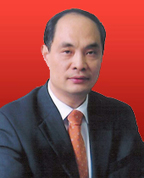 |
The Chinese University of Hong Kong, P.R. ChinaWebsite: http://www2.mae.cuhk.edu.hk/~jhuang/Email: |
Jie Huang studied Power Engineering at Fuzhou University from 1977 to 1979 and Circuits and Systems at Nanjing University of Science and Technology (NUST) from 1979 to 1982. He got his Master's degree from NUST in 1982 and was a faculty member there from 1982 to 1986. He completed his Ph.D. study in automatic control at the Johns Hopkins University in 1990 and subsequently held a post-doctoral fellow position there until July 1991. From August 1991 to July 1995, he worked in industry in USA. In September 1995, he joined the Department of Mechanical and Automation Engineering, the Chinese University of Hong Kong. He is now a professor and also the director of Applied Control and Computing Laboratory there. He has been advisory/guest professors at several universities. He holds a chair professor position at South China University of Technology and is the director of the Joint Research Center for Automation Science and Engineering, Chinese University of Hong Kong and South China University of Technology. He served as a Science Advisor to the Leisure and Cultural Services Department of Hong Kong Special Administrative Region, and Honorary Advisor to Hong Kong Science Museum. His research interests include control theory and applications, robotics and automation, neural networks and systems biology, and guidance and control of flight vehicles. He received IFAC Fellow award in 2009, Croucher Senior Research Fellowship award in 2006, IEEE Fellow award in 2004, and the best paper award (with Zhiyong Chen) of the Eighth International Conference on Control, Automation, Robotics, and Vision in 2004.
Jie Huang is an Editor-at-Large of Communications in Information and Systems, Editor-at-Large of International Journal of Control Theory and Applications, Advisory Editor for Asia of Transactions of The U.K. Institute of Measurement and Control, Subject Editor of International Journal of Robust and Nonlinear Control, and ACTA Automatica Sinica. He served as an Associate Editor of IEEE Transactions on Automatic Control from 2002 to 2004, and an Associate Editor of the Asian Journal of Control from 1999 to 2001. He has been Guest Editor for IEEE Transactions on Neural Networks, International, International Journal of Robust and Nonlinear Control, and Asian Journal of Control. He was Distinguished Lecturer of IEEE Control Systems Society from 2005 to 2008, member of the Board of Governors of IEEE Control Systems Society from 2006 to 2007. He served in organizing committee or operating committee of several major international Conferences including the general chair of 2002 International Conference on Control and Automation, Publicity Chair of 2003 IEEE Conference on Decision and Control, Program Co-Chair of 2005 Chinese Control Conference, Vice Program Chair of IEEE Conference on Decision and Control, and Program Chair of 2010 World Congress of Intelligent Control and Automation. He is Vice Chair of Technical Committee on Control Theory, Chinese Association of Automation.
PE Condition and the Parameter Convergence of the Adaptive Output Regulation of Nonlinear Systems
Adaptive control is an important control approach aimed at accounting for parametric uncertainty in a plant. The concept of the adaptive control was conceived in the 1950s and the problem has been extensively studied since the 1970s. One of the fundamental issues associated with the adaptive control is the stability property of the closed-loop system. For the class of linear systems, various conditions have been established to guarantee the global stability of the closed-loop system. In particular, if certain input signals satisfy the so-called persistency of excitation (PE) condition, then the equilibrium point of the closed-loop system can be made uniformly asymptotically stable. As the parameter estimation error is part of the state of the closed-loop system, the PE condition also guarantees the convergence of the estimated parameter vector to the true parameter vector. This result is established by applying a quadratic Lyapunov function to the closed-loop system. Under some standard assumptions, the derivative of the Lyapunov function along the trajectory of the closed-loop system is negative semi-definitive. Thus the closed-loop system is uniformly stable. Further, under the PE condition, the trajectory of the closed-loop system will uniformly converge to the origin, thus leading to the uniform asymptotical stability of the closed-loop system. Nevertheless, the stability issue of a nonlinear plant under an adaptive control law is not well addressed. In particular, it is unclear whether or not the PE condition can still guarantee the convergence of the estimated parameter vector to the true parameter vector. In this talk, we will address the stability issue in a nonlinear adaptive control system based on a key Lemma developed by Yuan and Wonham in 1977. We will use this lemma to show that, for a class of nonlinear systems in output feedback form, PE condition of certain signals can guarantee the global uniform asymptotic stability of the closed-loop system resulting from the class of adaptive control laws obtained by back-stepping method. Then we will further study the problem of the output regulation problem of output feedback systems subject to an unknown exosystem. It will be shown that if the internal model used for handling the output regulation problem is of minimal order, then certain relevant signals always satisfy the PE condition. Finally, we will demonstrate some practical applications of the adaptive output regulation approach.